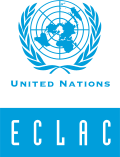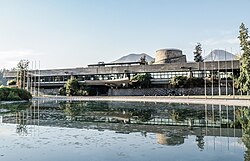United Nations Economic Commission for Latin America and the Caribbean
 | |
| Abbreviation | ECLAC |
|---|---|
| Formation | 1948 |
| Type | Primary Organ - Regional Branch |
| Legal status | Active |
| Headquarters | Santiago, Chile |
Head | Executive Secretary of the Economic Commission for Latin America and the Caribbean |
Parent organization | United Nations Economic and Social Council |
| Website | English Version |

The United Nations Economic Commission for Latin America and the Caribbean (UNECLAC, ECLAC or CEPAL, in Spanish: Comisión Económica para América Latina y el Caribe) is a United Nations regional commission to encourage economic cooperation. The ECLAC includes 46 member states (20 in Latin America, 13 in the Caribbean and 13 from outside the region), and 14 associate members which are various non-independent territories, associated island countries and a commonwealth in the Caribbean. The ECLAC publishes statistics covering the countries of the region[2] and makes cooperative agreements with nonprofit institutions.[3] The headquarters of ECLAC is in Santiago, Chile.
The ECLAC was established in 1948 as the UN Economic Commission for Latin America.[4][5] In 1984, a resolution was passed to include the countries of the Caribbean in the name.[6] It reports to the UN Economic and Social Council (ECOSOC).
Member states
[edit]The following are all member states of ECLAC:[7]
 Antigua and Barbuda
Antigua and Barbuda Argentina
Argentina Bahamas
Bahamas Barbados
Barbados Belize
Belize Bolivia (Plurinational State of)
Bolivia (Plurinational State of) Brazil
Brazil Canada
Canada Chile
Chile Colombia
Colombia Costa Rica
Costa Rica Cuba
Cuba Dominica
Dominica Dominican Republic
Dominican Republic Ecuador
Ecuador El Salvador
El Salvador France
France Germany
Germany Grenada
Grenada Guatemala
Guatemala Guyana
Guyana Haiti
Haiti Honduras
Honduras Italy
Italy Jamaica
Jamaica Japan
Japan Mexico
Mexico Netherlands
Netherlands Nicaragua
Nicaragua Norway
Norway Panama
Panama Paraguay
Paraguay Peru
Peru Portugal
Portugal Saint Kitts and Nevis
Saint Kitts and Nevis Saint Lucia
Saint Lucia Saint Vincent and the Grenadines
Saint Vincent and the Grenadines Republic of Korea
Republic of Korea Spain
Spain Suriname
Suriname Turkey
Turkey Trinidad and Tobago
Trinidad and Tobago United Kingdom of Great Britain and Northern Ireland
United Kingdom of Great Britain and Northern Ireland United States of America
United States of America Uruguay
Uruguay Venezuela, Bolivarian Republic of
Venezuela, Bolivarian Republic of
Associate members
[edit]The following are all associate members of the ECLAC:[7]
Locations
[edit]
- Santiago, Chile (headquarters)
- Mexico City, Mexico (Central American subregional headquarters)
- Port of Spain, Trinidad and Tobago (Caribbean subregional headquarters)
- Bogotá, Colombia (country office)
- Brasília, Brazil (country office)
- Buenos Aires, Argentina (country office)
- Montevideo, Uruguay (country office)
- Washington, DC, United States of America (liaison office)
Executive secretaries
[edit]| Name | Country | Served |
|---|---|---|
| José Manuel Salazar-Xirinachs | September 2022 – | |
| Alicia Bárcena Ibarra | July 2008 – March 2022 | |
| José Luis Machinea | December 2003 – June 2008 | |
| José Antonio Ocampo | January 1998 – August 2003 | |
| Gert Rosenthal | January 1988 – December 1997 | |
| Norberto González | March 1985 – December 1987 | |
| Enrique V. Iglesias | April 1972 – February 1985 | |
| Carlos Quintana | January 1967 – March 1972 | |
| José Antonio Mayobre | August 1963 – December 1966 | |
| Raúl Prebisch | May 1950 – July 1963 | |
| Gustavo Martínez Cabañas | December 1948 – April 1950 |
See also
[edit]- Library of the Economic Commission for Latin America and the Caribbean
- United Nations System
- ELAC Action Plans – Intergovernmental strategy
- Association of Caribbean States
- Community of Latin American and Caribbean States
References
[edit]- ^ "United Nations Secretary-General appoints Mr. José Manuel Salazar-Xirinachs of Costa Rica as Executive Secretary of the Economic Commission for Latin America and the Caribbean". un.org. 1 September 2022. Retrieved 11 September 2022.
- ^ CEPALSTAT Archived May 19, 2012, at the Wayback Machine page at official ECLAC site
- ^ ECLAC signed a cooperation agreement to promote science and technology in the region (with Brazilian Center for Strategic Studies and Management) at ECLAC.org
- ^ Cypher, James M.; Dietz, James L. (2009). The process of economic development. London & New York: Routledge. ISBN 978-0-415-77103-0.
- ^ Fajardo, Margarita (2023). "CEPAL, the "International Monetary Fund of the Left"?". The American Historical Review. 128 (2): 588–615. doi:10.1093/ahr/rhad226. ISSN 0002-8762.
- ^ ABOUT ECLAC at official ECLAC site
- ^ a b Economic Commission for Latin America and the Caribbean (n.d.). "Date of Admission of Member States (46) and Associate Members (13) of ECLAC" (PDF). Economic Commission for Latin America and the Caribbean. United Nations. Retrieved 22 December 2018.
External links
[edit]- Official website – UN Economic Commission for Latin America and the Caribbean
